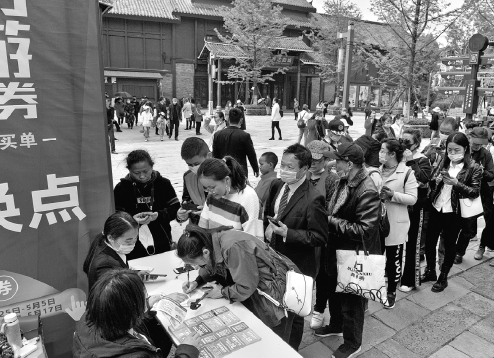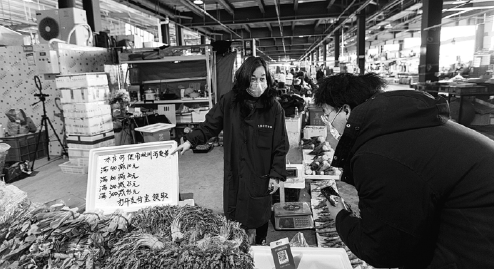Shoppers targeted in bid to boost spending
Offline consumption spurred by issuance of e-vouchers
Since March, a number of provincial and city governments in China have rolled out measures to distribute shopping vouchers to consumers to rejuvenate consumer buying during the COVID-19 pandemic.
While these steps have been effective in many places nationwide, experts are calling for better implementation and other long-term approaches to help retain consumer confidence.
The country's first provincial-level plan to boost consumption was announced by Zhejiang province on March 12.
The move followed a call by President Xi Jinping on Feb 21 at a meeting of the Standing Committee of the Political Bureau of the Communist Party of China Central Committee for household consumption to be firmed up and new consumer purchasing potential unleashed.
On March 26, authorities in Hangzhou, capital of Zhejiang, announced that e-vouchers worth a total of 1.68 billion yuan ($237 million) would be distributed to city residents in the coming months. The vouchers were financed by 500 million yuan in government subsidies and 1.18 billion yuan in business discounts to help bolster the hard-hit consumer market.
The vouchers can be obtained on Alibaba's financial service platform Alipay. Consumers are eligible for a cash rebate for offline payments within seven days of receiving the vouchers.
With 6 million brick-and-mortar shops involved in the program, the Hangzhou government expects it to be an effective approach to encourage consumption and support offline vendors.
Zhu Zheng, deputy director of the city's commerce bureau, said it started to consider supporting offline shopping at the end of February and carried out numerous surveys when looking for solutions.
"We were told by some shop owners that they were most concerned about having a normal market, and government policies would be helpful. We decided to make it as easy as possible for people to apply for and use the vouchers," Zhu said, adding that encouraging them to go out and shop was the priority at the time.
The vouchers can be used at nearly all shops in Hangzhou, as the government wants small businesses, in addition to large supermarkets and shopping malls, benefit from the program.
Zhong Yu, a Hangzhou resident who obtained the vouchers in four rounds of applications, said they have helped her save an estimated 200 yuan on her shopping bills.
"Each voucher offered a rebate of 10 yuan when my spending surpassed 40 yuan. I understand that the vouchers were issued mainly to encourage people to go out and support offline vendors, but I think that they could also be used online," she said.
Zhong added that she thinks the online market is also important for economic growth and that young people prefer shopping in cyberspace.
Cities follow suit
Distribution of the vouchers has been put on hold in Hangzhou since the end of April, after six rounds of applications. However, they are still being issued in other cities in Zhejiang, including Ningbo and Shaoxing.
Across the country, more cities are attempting to spur economic development by issuing the vouchers.
Early last month, Wang Bingnan, vice-minister of commerce, said at a news briefing that vouchers worth a total of more than 19 billion yuan had been handed out in more than 170 cities to boost consumption.
Such initiatives are still underway in many places. Xi'an, capital of Shaanxi province, distributed its first batch of e-vouchers worth a total of 5 million yuan in the middle of last month. Issued on a first-come, first-served basis, stocks were exhausted within 10 minutes of the vouchers being released on May 19.
Responding to consumer enthusiasm, the city issued a second batch, also worth 5 million yuan in total, on June 10. Again, supplies ran out within minutes.
In Lhasa, capital of Tibet autonomous region, the authorities plan to distribute vouchers worth a total of 30 million yuan in three batches-from June 6 to July 20-to people who shop in the city during this period.
There are three types of voucher in Lhasa: those for use at supermarkets; universal ones for purchases at all shops in the city except for supermarkets; and "lucky vouchers", which are distributed through a random draw. Those who receive the latter type can save 80 yuan on purchases involving more than 300 yuan.
More effective
Some people have questioned why local governments chose to issue vouchers online, rather than distribute cash to people.
Pan Helin, executive dean of the Digital Economy Academy at Zhongnan University of Economics and Law in Wuhan, Hubei province, has the answer.
"Theoretically speaking, cash is a more direct and simple stimulus. Some countries across the world have adopted this method to boost consumption, because residents have been less willing to save money. People in these countries will spend the money on consumption after they receive it," he said.
However, in China, as people generally have a stronger sense of saving, distributing e-vouchers will be more effective than cash in stimulating consumption, he said.
The measures have clearly been effective. As of April 26, four days before a sixth round of distribution in Hangzhou, government-funded vouchers worth a total of 380 million yuan had been used in the city, generating 4.2 billion yuan in consumer spending, according to Zhu, from the commerce bureau.
On May 15, led by professor of economics Justin Yifu Lin, the National School of Development at Peking University conducted a study into the issuance of e-vouchers.
A report released by the university said the vouchers help when local governments try to restore economic order, and digital technologies play an important role in improving their distribution.
The report also said economies in areas where vouchers have been issued to encourage consumption are recovering faster than those elsewhere, especially the service sector.
Lin, who is also honorary dean of the university's National School of Development, said vouchers are helpful in "ensuring the healthy operation of families and enterprises". He called on governments to adopt such measures and to step up investment.
Zhao Ping, a researcher at the Academy of China Council for the Promotion of International Trade, said the use of e-vouchers is still limited because some sectors, such as culture, sports and entertainment, have not resumed operations under COVID-19 prevention and control measures. However, it is hoped that vouchers can soon play a bigger role.
"Consumers are still cautious about going to venues with crowds," she said, adding that as the pandemic loosens its grip nationwide, more people will return to work and enterprises will resume production. As a result, the role the vouchers play in bolstering consumption will become more apparent.
Wang, the vice-minister of commerce, said distributing vouchers is a positive move and has been conducive to propping up consumption.
Tourism discounts
Pan suggested that the aim of the vouchers should be to benefit people on medium and low incomes and industries severely affected by the pandemic.
For example, in Zhejiang, the provincial culture and tourism department decided to issue vouchers worth a total of 220 million yuan to boost tourism, which has been seriously hit by the outbreak.
Culture and tourism vouchers offer discounts for visits to scenic areas and stays at local hotels.
Shen Yan, a professor of economics at Peking University, suggested that based on the institution's report, a national voucher distribution policy be drawn up and digital technologies used to ensure transparency, efficiency and fairness.
"Through studying voucher programs nationwide, we believe that such incentives will be good to protect the high-quality development of the Chinese economy in the long run," she said.
Zhao, from the Academy of China Council for the Promotion of International Trade, while confirming the role of e-vouchers in boosting the economy, said they are not a "once and for all" solution.
She said the vouchers are backed by administrative funding, and to avoid adding to their burden local governments should assess their financial situation carefully before deciding to issue them.
Wang Xianqing, chairman of the Guangdong Society of Commercial Economy, said he believes that local governments fully consider the characteristics of different industries and local consumption needs before deciding to issue e-vouchers. As a result, the vouchers can spur industrial development and boost consumption.
"Issuing the vouchers has proved effective in creating a good atmosphere for consumption and guiding people to spend in specific sectors," he said.
"But local governments shouldn't exaggerate or rely too much on this effectiveness," he said, adding that they should switch their attention from raising consumption in the short term to working out long-term policies to increase people's willingness to spend.
Capital welcomes move
In Beijing, consumers and business operators have hailed the decision to issue e-vouchers to residents.
On June 3, authorities in the capital announced they would offer vouchers worth a total of 12.2 billion yuan and distribute them through several rounds.
The municipal government said the policy would be in effect from June 6 to the National Day holiday in early October.
However, it was announced on Monday that all offline promotional activities would be suspended due to new COVID-19 cases discovered at the Xinfadi Wholesale Market in the southwest of the city.
This month alone, the vouchers are being distributed in four batches-on June 6, June 13, June 20 and June 27.
The first batch on June 6 was distributed through e-commerce company JD and an official WeChat account. The vouchers can be used at restaurants and retailers in Beijing, as well as to buy products online.
Data compiled in the days following the release showed the efforts were paying off.
Chaoyang Hopson One, the second-largest shopping center in Beijing, occupying an area of 190,000 square meters, held a series of events related to the vouchers and helped shops promote such activities. The vouchers can be used in some 80 percent of shops in the mall.
During the weekend, the number of visitors to the mall returned to the level seen at this time last year.
Zhang Xi, chief branding officer for the mall operator, Hopson Commercial Properties, said sales revenue at all premises owned by the group rose after the government started offering the vouchers.
"We hope more activities like this will be held, and we will actively cooperate with the government to boost consumption," Zhang said.
The Beijing Department Store in Wangfujing saw rises of 30 percent and 28 percent, respectively, in visitors and revenue on June 6, compared with the previous day. The number of visitors to the store on June 6 was about 85 percent of the level seen on that date last year.
The vouchers have played an important role in boosting consumption, according to JD. On June 6, some 39 percent of them were used in restaurants in Beijing and 61 percent in physical stores, it said.
Ding Leilei, a young engineer in the city, who always orders takeout for lunch, found that he could obtain a 10-yuan voucher when he paid for his food.
"It makes me feel good," he said. "Who would be unhappy about enjoying the same product for less money?"
To encourage consumption, Fengtai is just one of many districts in the city that have staged a range of events to attract consumers.
On June 6, He Hong, a flower arranging enthusiast in Fengtai, took part in a special promotional event staged by the district government to boost consumption.
"Dressed in traditional Chinese costumes, we had a lesson about flower culture and arrangement at a cultural center, which I greatly enjoyed," she said. "I would like to spend money on such services, as well as on beautiful flowers. Plus, I've got the coupons from the government."
Contact the writers at [email protected]

Visitors line up to collect e-vouchers in Wanda town, Danzhai, Guizhou province. QIAO QIMING/FOR CHINA DAILY

Hair salons and vegetable markets in Hangzhou, Zhejiang province, are encouraging people to use e-vouchers. CHINA DAILY

Hair salons and vegetable markets in Hangzhou, Zhejiang province, are encouraging people to use e-vouchers. CHINA DAILY
-
'Nice' to meet you, Hangzhou
May 6, 2024



